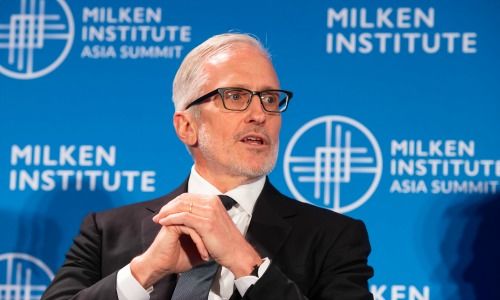Jim Coulter: «We Are Totally Unprepared»
The American billionaire investment manager said the private equity industry's opaqueness would be its undoing, and gave about his views on technology and investing through economic cycles at the Milken Institute Asia Summit.
The private equity industry needs to do a better job at communicating with stakeholders and the public, TPG Capital co-CEO and founding partner James (Jim) Coulter said on a panel on global opportunities in private equity at the Milken Summit in Singapore on Friday.
«We spent all our time being quiet. Eventually, you're going to get to a point where somebody else is going to tell the story for you. So we became locusts; we became chainsaws,» Coulter said about the industry's reputation, especially in relation to job creation and its role in meeting environmental, social and governmental goals.
«We are totally unprepared for what's going to happen as an industry,» he said, adding measures individual firms are taking now to address this are «likely too little too late,» and that the industry is likely to «take some hits» during the 2020 U.S. presidential election campaign.
How to be Successful in Asia
Coulter said that to date, Asian private equity returns in total «haven't really delivered as much as people have expected,» but the firm is optimistic about its prospects in the region.
«It's going to be a different game in the coming decade than the last two,» he said, emphasizing that private equity firms need to have a set of skills and perspective that are localized in the Asian market, yet informed by global trends and knowledge.
«I think this concept of Asian private equity is a little bit of a myth,» Coulter he added, noting the continent's diverse markets. «The value of Asian private equity is to act locally.»
Having been through three crises since the firm started in Asia in 1994, he advised investors to «be brave and humble» because «when it feels bad, it's good, and when it feels good, it's almost always going to be bad. This phase shift is a real psychological challenge in the industry.»
Leaving a Legacy
Coulter said the post-Friedmanism era is one where private equity has to both deliver returns and think about what it is doing in the world. «Across financial services, private equity has a unique role in that,» Coulter said, pointing out that the industry has the ability to put more women on boards of companies, and needs to do more to meet the United Nation's sustainable development goals.
«What I hope that my legacy will be, in part, is that not only will I leave a firm behind, but an industry that is more aware of what good it can do, and more able to actually deliver.»






















